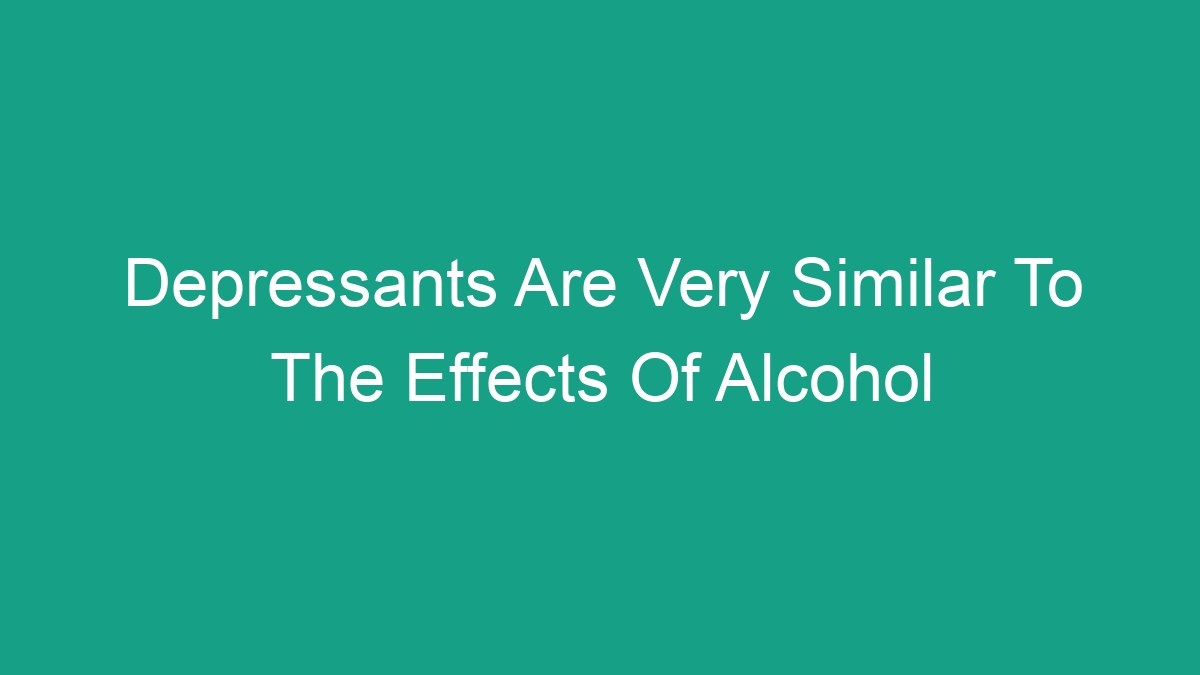
Depressants are a class of drugs that slow down the central nervous system and are often used to treat anxiety, insomnia, and other related conditions. While they can be beneficial when used under a doctor’s supervision, they also have the potential for abuse due to their sedative and calming effects. Interestingly, the effects of depressants are very similar to the effects of alcohol, which is also a depressant.
What are Depressants?
Depressants, also known as central nervous system depressants, are a class of drugs that work by slowing down brain activity. They achieve this by enhancing the neurotransmitter gamma-aminobutyric acid (GABA), which inhibits brain activity. There are several types of depressants, including:
- Benzodiazepines: These drugs are commonly prescribed to treat anxiety, panic disorders, and insomnia. Examples include Xanax, Valium, and Ativan.
- Barbiturates: Barbiturates were once commonly used as sedatives and anesthetics, but their use has declined due to the high risk of overdose and addiction.
- Non-Benzodiazepine Sleep Medications: These drugs, also known as Z-drugs, are used to treat insomnia. Examples include Ambien, Lunesta, and Sonata.
Effects of Depressants
When taken as prescribed, depressants can have therapeutic effects such as relief from anxiety, improved sleep, and relaxation. However, when misused or abused, depressants can lead to a range of negative effects, including:
- Slurred speech and impaired coordination
- Confusion and disorientation
- Drowsiness and fatigue
- Mood swings and emotional blunting
- Memory impairment
- Respiratory depression and slowed heart rate
- Overdose and death
Similarities to Alcohol
Alcohol is perhaps the most widely used depressant, and its effects are remarkably similar to those of other depressant drugs. Some of the similarities between the effects of depressants and alcohol include:
- Sedation: Both depressants and alcohol can induce a state of calmness and relaxation, leading to sedation and drowsiness.
- Impaired Coordination: Depressants and alcohol can both impair motor skills and coordination, leading to clumsiness and difficulty performing tasks that require precision.
- Slurred Speech: Both depressants and alcohol can cause slurred speech, making it difficult for the individual to communicate clearly.
- Memory Impairment: Both depressants and alcohol can interfere with short-term and long-term memory, leading to forgetfulness and difficulty retaining new information.
- Respiratory Depression: In high doses, both depressants and alcohol can depress the respiratory system, leading to slowed breathing and, in severe cases, respiratory failure.
Risk of Combining Depressants and Alcohol
Given the similarities in their effects, combining depressants with alcohol can amplify the sedative and respiratory-depressant effects, leading to dangerous outcomes. In fact, the combined use of depressants and alcohol is particularly risky and can result in:
- Severe sedation and drowsiness
- Impaired judgment and decision-making
- Increased risk of accidents and injuries
- Coma and death
It’s crucial to understand the potential dangers of combining these substances and to seek medical advice before using them together, especially for individuals with a history of substance abuse or respiratory problems.
Legal Status and Regulation
Depressants are regulated substances and are classified as controlled substances due to their potential for abuse and addiction. In the United States, depressants are categorized under different schedules according to their medical use and potential for misuse.
For example, benzodiazepines are classified as Schedule IV drugs, which means they have a low potential for abuse relative to drugs in Schedule III. On the other hand, barbiturates are classified as Schedule II drugs due to their high potential for abuse and dependence. Non-benzodiazepine sleep medications are also regulated due to their sedative effects and potential for misuse.
Seeking Help
If you or someone you know is struggling with the misuse of depressants or alcohol, it’s essential to seek help from a healthcare professional or addiction treatment center. Recovery is possible, and there are various treatment options available, including detoxification, residential treatment, outpatient programs, and counseling.
By addressing the underlying issues and gaining support from qualified professionals, individuals can overcome substance use disorders and reclaim their lives.
Conclusion
Depressants are a class of drugs that can produce effects similar to alcohol, including sedation, impaired coordination, and memory impairment. Due to their potential for misuse and the risk of combining them with alcohol, it’s crucial to use these substances responsibly and under medical supervision. Seeking help for substance use disorders is the first step towards recovery and a healthier, more fulfilling life.
Understanding the effects and risks of depressants and alcohol is key to making informed decisions about their use and seeking help when needed.


